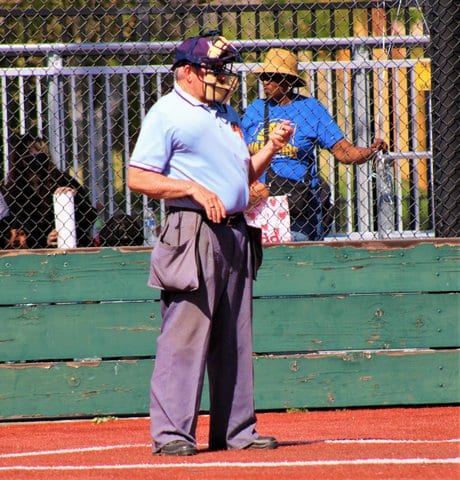
01 Nov ‘Everybody Has a Breaking Point’: Umpire Shortage Hurting Youth Sports and Officials Themselves

Scott Wells prepares to call balls and strikes behind home plate for a softball game in Richmond on a two-man umpire crew.
Story and photos by Joe Porrello
Many communities are struggling with shortages of teachers and police officers, with many saying the stresses of those jobs just are not worth it. Something similar is happening in youth sports.
Finding umpires to call Bay Area youth baseball and softball games is becoming progressively difficult. Local officials spoke with the Pulse about the scarcity.
Verbally and physically aggressive parents are a top reason.
“A lot of the parents in these age groups are the most abusive to officials, which is partly why they can’t find umpires,” said Bethel High baseball coach and former umpire J.R. Lindsey, referring to the parents of kids in elementary through high school.
A quick online search shows hundreds of stories and videos surrounding physical attacks on sports officials throughout the U.S.
“Officials are tired of the abuse and tired of the threats,” said Dennis Binnion, an umpire assignor and official of 28 years. “People’s lives are being threatened, getting followed to their cars. It’s getting worse and worse every year.”
Umpire Kristi Moore was punched and given a black eye leaving the field after a 2022 softball game for 12-and-under girls in Mississippi.
Conrad Bassett, an official of 42 years, said his umpire crews always leave the field as a group for safety.
According to the National Association of Sports Officials, 46% said they feel unsafe due to spectator or coach behavior.
Hurt most by the shortage are young players, who sometimes have to scrimmage or cancel games because there is nobody to objectively enforce the rules. Last season, Bethel High traveled to Richmond High for an official game but ended up having to lend the Oilers players to complete a practice game.
- Bethel High’s J.R. Lindsey had to coach his Jaguars and the opposing Richmond Oilers on March 24 — and handle umpiring duties.
Parents and coaches who argue set bad examples for the youth, often embarrassing their children and players. “Players have asked me to throw their parents out,” said Lindsey, who recently retired from umpiring after 20 years.
The on-field product also suffers. Lindsey said his team has had single-umpire games multiple times this season.
“That should never happen,” he said.
Normally, there are at least three umpires per crew.
Binnion said lack of experience also contributes to the drop in officiating quality.
“You’re getting rookies who aren’t experienced out here doing high-level games,” he said. “It’s not fair to the kids, but at least they get to play.”
Wells had similar feelings.
“It was tough to break into this profession during the ’80s; I didn’t do a varsity game for seven years,” he said. “Nowadays, there are first-year guys doing varsity games, and some of the training, you can’t get out of a book; you need experience.”
Dan Hughey, founder of the 49-year-old, Walnut Creek-based Mid-County Officials Network, said the standards of his association have lowered.
“There’s a drop in quality but also quantity,” he said. “Some games can’t be covered because there’s not enough officials.”
Hughey summarized the timeline of dwindling Bay Area referees.
“There was a plethora of officials up until about 12 to 15 years ago. That’s when the decline started,” said Hughey, who has been an official for 60 years. “Ten years ago, I can remember meetings with over 100 officials. Now, we only have about 40.”
This isn’t only happening in the Bay Area. “It’s completely national,” said Wells. “Everybody’s hurting for umpires.”
Binnion illustrated Wells’ point.
“My cousins in Mississippi have the same problem,” he said, referring to the umpire shortage.
All youth sports are feeling the effects, not just baseball and softball.
- Referees of San Pablo FC’s Feb. 25 win over San Leandro United had their hands full in El Sobrante, dealing with grief from both teams.
According to the National Federation of State High School Associations, 50,000 referees have been lost nationwide since the 2018-19 season, about one-fifth of the U.S. total.
Hughey said baseball and softball are particularly hard hit because of formatting and logistics.
Many other sports require fewer officials per crew and can be played back-to-back without sunlight restrictions. Though, the relative convenience of consecutive games is not always ideal.
“You’ve got officials that are tired of doing multiple games a day for six days a week,” said Binnion.
Many sports are played during the spring, which leaves few officials to cover many games. Sometimes, the downsides of umpiring cause officials to choose other sports.
Umpiring requires a larger initial investment than other sports. Those starting out must purchase equipment that can cost hundreds of dollars.
Umpires wear lots of heavy protective gear, often in extreme heat, while some other officials wear light and comfortable attire, often in a climate-controlled setting.
“It does take a wear and tear on your body,” said Lindsey.
- The protective equipment home plate umpires, in particular, must wear is both expensive and cumbersome, especially as they crouch for hours in hot sun.
Binnion said football is the hardest sport for him to assign officials because of the four-man crew needed, often-adverse weather because of the time of year it’s played, the pace, and in-game violence that causes parents and coaches to sometimes blame referees for player injuries.
Bassett said officiating becomes harder with age, so there are even fewer officials available; he’s had to do four football games in one day.
For MCON umpires, Hughey said the average age is 60.
“The attrition level is certainly through retirement and death,” he said . “Young people just aren’t interested.”
Lindsey said there are not many new faces coming into the profession.
“There’s a lack of young umpires because they don’t want to do it when they see them constantly being yelled at,” he said. “Who wants to get ridiculed at work?”
Binnion noted that despite their experience, the growing age of umpires sometimes contributes to a decline in quality.
“We try to recruit people, and they just don’t want to do it, so that leaves it up to the older guys who maybe don’t move as fast or can’t see as well,” he said.
An increase in officials’ pay does not seem to be the quick fix some might think.
Hughey said a 21% payment increase in MCON officials’ last contract to attract more employees did not solve the issue.
Binnion illustrated Hughey’s point.
“I always say there’s not enough money in the world for the abuse we take,” he said. “It’s not about the money. I like to give back to the community and help the kids out, but it’s getting to the point now where it’s not even worth it.”
COVID-19 also played a part in the shortage.
“The pandemic really hurt us,” said Lindsey. “There was tons of games being canceled, and when you’re out of umpiring for a few years, it’s hard to get back into it.”
An additional factor in the scarcity is volatility of scheduling.
Officials usually get their schedules 30 days in advance, but games are frequently canceled the day of because of bad weather or because there aren’t enough players.
Wells said he recently had games switched day-of for a week straight. Then, he often changes clothes and equipment on the spot to officiate a different sport.
Hughey said the majority of MCON referees are multi-sport officials, which requires 18 hours of state-mandated training per sport, per year.
Bassett said many new leagues have arisen over the last decade, which has led to more demand for officials with less supply.
Specific locations around the Bay Area and the country feel the shortage more because of safety concerns.
“Some officials won’t work at schools in certain areas,” said Binnion. “I’ve heard gunshots doing a game, and the kids said they were used to it.”
Bassett said he heard gunfire working in Richmond at Kennedy High but said he has enough experience around the Bay Area to feel safe.
According to Binnion, social media fuels a lot of the aggression because players and fans “talk trash” before the game, leading to tension.
Binnion also said it only takes one incident for an umpire to call it quits, like a catcher purposely missing a pitch so it strikes the umpire in the facemask.
“Everybody has a breaking point,” he said.
Bassett said there aren’t enough officials at the high school level because the most dedicated use it as a springboard for promotion to the college level, while those at lower levels are less serious or less experienced.
This story continues. Read Part Two:
Tactics to Halt Shortage and Silver Linings Within it Have Local Umpires Optimistic



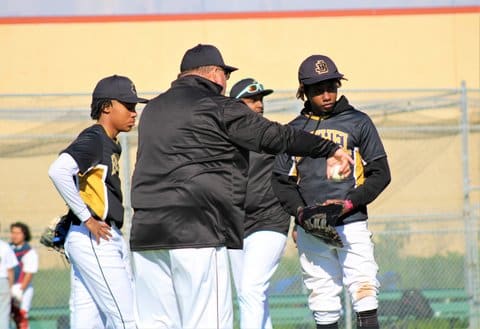
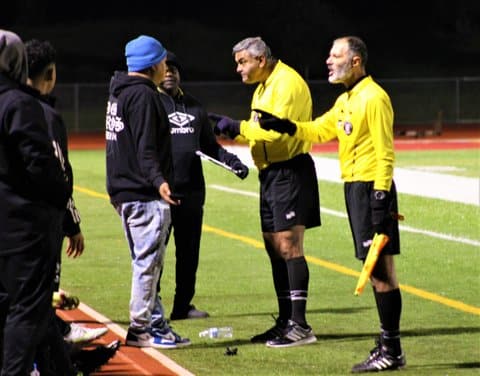
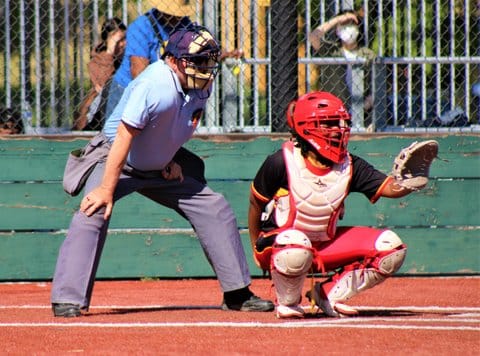
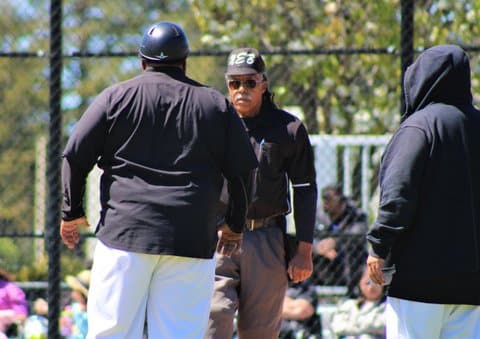


No Comments